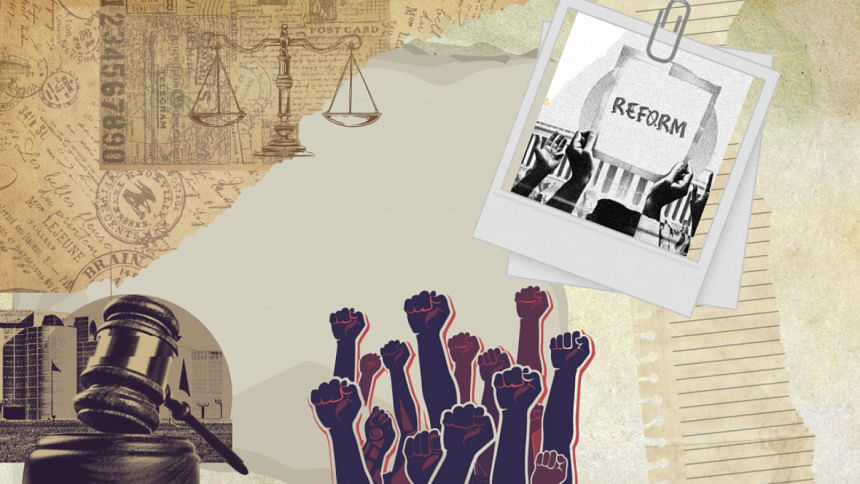
Last update on: Thu Jul 17, 2025 10:20 AM

The absence of rule-based functioning of the state led the country into an oligarchy during the previous regime. The erosion can be attributed to collusion between rule-makers (politicians) and a section of money-makers (business elite). Complexity also arises from the country’s inherited bureaucratic structure, originally designed by the British for colonial resource extraction.
The task of state-building is to establish an executive branch, comprising two distinct yet interconnected components: elected executives (politicians gaining office through democratic elections) and career executives (civil servants appointed based on merit and expertise). This division can strike a delicate balance between democratic representation and administrative efficiency. However, in Bangladesh, the crucial distinction between elected and career executives has unfortunately never truly gained a foothold.
The tripartite patronage of business, politics, and bureaucracy forms the bedrock of the oligarchic structure, where business elites fund political campaigns and gain legislative favours, while simultaneously securing the cooperation of career executives in implementing policies beneficial to their interests. This involves a complex web of informal understandings and quid pro quo arrangements, blurring ethical boundaries and diverting state resources for private gain. Thus, civil service appointments and promotions are frequently influenced by loyalty to the ruling party rather than by merit or professional competence.
Another significant factor is the decay of institutions designed for checks and balances. Critical independent bodies, such as the judiciary, parliamentary oversight mechanisms, the Election Commission, the Office of the Comptroller and Auditor General (OCAG), and the Anti-Corruption Commission (ACC), are struggling to operate with autonomy. Their powers are frequently curtailed or their appointments influenced, ensuring that they primarily serve the interests of the ruling elite rather than acting as genuine bulwarks against abuse of power. Without robust checks and balances, the distinction between the elected mandate and bureaucratic implementation fades into a unitary, self-serving apparatus, where power remains concentrated and largely unchallenged.
A demarcation between political appointees and career bureaucrats
The historical development of the executive branch highlights different approaches to political accountability and administrative competence.
In Europe, the emphasis has been on establishing a professional and impartial civil service. The United Kingdom, through its Northcote-Trevelyan Report of 1854, initiated a merit-based civil service to ensure continuity in governance irrespective of changes in elected leadership. France adopted a centralised, elite bureaucracy under the Napoleonic system, operating independently to implement policies set by elected officials. Germany, with its Weberian model, has a non-partisan, rule-bound bureaucracy.
The US grappled with the “spoils system” in the 19th century, where elected leaders appointed loyalists, often leading to corruption. The Pendleton Act of 1883 marked a turning point, introducing merit-based recruitment. Today, the US executive branch is a blend of political appointees, such as cabinet secretaries, and career civil servants who are largely protected from partisan removal.
Many Asian and African developing countries inherited colonial bureaucracies. These countries have witnessed civil service appointments turn into tools for patronage, undermining institutional autonomy and efficiency. Botswana, in Africa, stands out as a notable exception, with a relatively meritocratic bureaucracy. Singapore is a beacon of a merit-based bureaucracy.
In Latin America, countries such as Brazil and Argentina have experienced cycles of politicisation, where new governments frequently replace bureaucrats with loyalists. In contrast, Chile has developed a more stable civil service.
Key reforms are needed, particularly in the “rules of business,” to transform the executive branch for state-building towards a citizens’ republic.
A critical step is to legally protect career executives from arbitrary transfers and dismissals. The US’s Civil Service Reform Act of 1978, the UK and France’s principles of a merit-based, autonomous civil service, and Germany’s Länder system can offer insights. Botswana’s experience provides a model for effective anti-patronage bureaucratic reforms. There is also a need for a whistleblowing law.
Establishing a truly independent Public Service Commission is essential for appointments and a senior selection board for promotions on merit.
Public money accountability framework
The country’s accountability framework for public money and revenue rests on three constitutional pillars: legislative authorisation for any expenditure, independent audit by the Comptroller and Auditor General (CAG) under Article 128 of the constitution and the Comptroller and Auditor General (Additional Functions) Act, 1974 (now replaced by the Public Accounts Audit Ordinance, 2025), and parliamentary scrutiny through the Public Accounts Committee. Together, these mechanisms can establish a robust foundation for fiscal transparency. Yet, certain provisions in the 2025 ordinance require a revisit to safeguard the OCAG’s autonomy to ensure that audits of revenue assessments are fully integrated to preserve the integrity of public financial management.
The 2025 ordinance formalises audit procedures by vesting the performance audit mandate in the CAG. Despite institutional enhancements, there are concerns about executive influence. Notably, any rules or agreements with foreign or international bodies now require government approval—a move that might constrain the CAG’s operational independence and conflict with Article 128(4) of the constitution, which prohibits external direction or control over the CAG’s duties.
Additionally, while the ordinance permits audits of revenue receipts credited to the consolidated fund, it excludes audits of the accuracy of tax and non-tax revenue assessments, creating an accountability gap in revenue collection processes. This could open avenues for collusive fraud in revenue assessment. It also deviates from the Supreme Court’s directives on comprehensive audit coverage.
To curb undue influence, strict laws on campaign finance must be enacted and enforced to limit recorded and unrecorded donations and lobbying. Mandatory disclosure of politicians’ business interests, similar to the US’s Stop Trading on Congressional Knowledge (STOCK) Act, could enhance transparency and accountability, helping to identify potential conflicts of interest.
The ACC needs to be significantly empowered with genuine autonomy and resources to effectively investigate collusion amongst politicians, bureaucrats and business elites. Furthermore, robust judicial oversight is necessary to review arbitrary executive decisions and ensure adherence to legal and constitutional norms.
In the grand mechanism of a state, the elected executive is the engine, and the career executive is the transmission.
For Bangladesh to truly navigate the road of progress, these two vital components need to work in harmonious and seamless coordination, transcending its colonial bureaucratic past.
Without reforms to depoliticise the civil service, install local self-governments, and enforce transparency and accountability, the nation risks an entrenched system that hinders the journey towards public welfare. A transformed, effective, and strong executive can only champion rule-abiding state-building and uphold the social contract for a citizens’ republic.
Dr Rashed Al Mahmud Titumir is professor at the Department of Development Studies, University of Dhaka.
Views expressed in this article are the author’s own.









